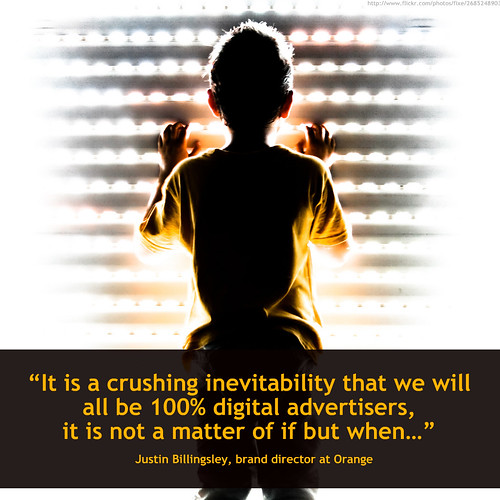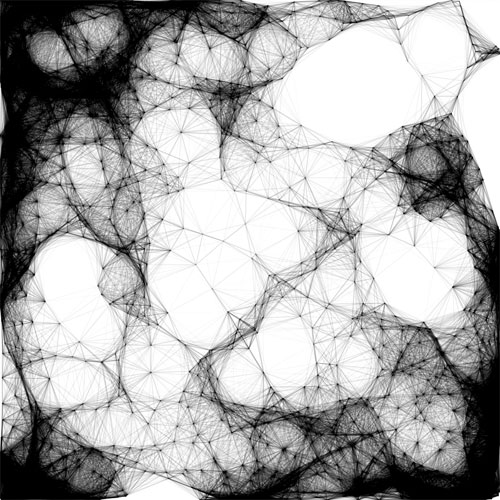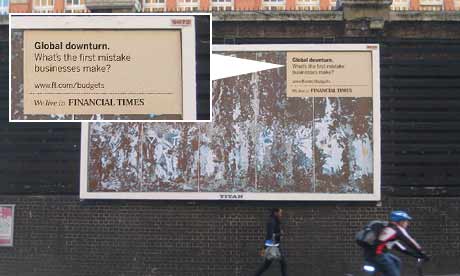Sunday, 1 March 2009
Thursday, 15 January 2009
quality adwords
Posted by
Will
at
10:39
2
comments
![]()
![]()
Labels: communications, digital, internet, media, websites
Thursday, 8 January 2009
like glowing ants
This is global air traffic in a 24 hour period as captured by satellite (and they all seem to be going to London.)
Posted by
Will
at
14:17
1 comments
![]()
![]()
Labels: data, design, digital, geotility, technology
Wednesday, 7 January 2009
google new year
The genius of Google’s advertising is that it doesn’t look like advertising while probably doing a better job than most advertising. It’s so functional, so straight-up. It doesn’t even feel like false altruism where you know that your wallet will have to appear at some point. It’s just lovely, simple and it perpetuates the use of Google.
Posted by
Will
at
13:28
0
comments
![]()
![]()
Labels: communications, digital, internet, media
Thursday, 11 December 2008
what's digital and why you should apply

It might be overstated (there’s probably always going to be the “‘bed, bog, bath’ element”) but Mr Billingsley’s comment is almost certainly right: we’re going to be digital advertisers because the world is now digital, and getting more so.
What does all this digital malarkey mean for people looking to get into the communications business and, before we look at that, what does digital mean anyway?
There are two important things there for grads trying to get into the industry. The first is, “whose roof”?
This interactivity let’s you do a lot more than you can at your typical traditional ATL agency. Or to reunite that idea with its owner:
I think that's really exciting (and Mr Tait has 9 more great reasons digital is better for those interested). In digital you’re unshackled from just doing TV, print and radio to all sorts of exciting things like sites, applications, blogs, games, branded content, widgets, podcasts, social things and experimental stuff. And a lot of this (not all) is actually useful to people; it's additive rather than interruptive.
In my experience grads tend to think of digital as something on-the-sidey and techy. Maybe it once was. Now it ain’t. Technology is so ubiquitous, so ‘ready-to-hand’, that it’s becoming invisible and when that happens it gets socially interesting. In other words, technology and culture used to be separate, increasingly they are the same (look what you're doing now.)
It’s a brilliant time to get into an industry that’s only going to grow (even in these tough times) and that’s much more about interesting interactive ideas than it is about tech.
Go on, apply!
Obviously I am biased but this would be a good place to start...
(For those wanting more, I suggest you have a play in here, read this, canoe back up this and maybe watch this. That should be enough to be getting on with.)
Posted by
Will
at
18:06
8
comments
![]()
![]()
Labels: communications, data, design, digital, internet, media, mobile, websites
Monday, 10 November 2008
a good, good guide
Posted by
Will
at
16:02
0
comments
![]()
![]()
Labels: data, digital, internet, ordinary, software, technology, websites
Saturday, 8 November 2008
50,000
Posted by
Will
at
00:02
0
comments
![]()
![]()
Labels: blogs, communications, design, digital, internet, media, mobile, photography, software, websites
Friday, 7 November 2008
getting creepy
 New technologies can look like magic. That's Douglas Adams speaking.
New technologies can look like magic. That's Douglas Adams speaking.
Posted by
Will
at
23:01
0
comments
![]()
![]()
Labels: data, digital, geotility, internet, media, psychology, software, technology, trends
Thursday, 30 October 2008
Friday, 17 October 2008
clients paying agencies to advertise agencies
Posted by
Will
at
22:43
0
comments
![]()
![]()
Labels: communications
turn left where the telephone box used to be
- A man asks for directions to a shop in a small town. The postman tells hims to go up the road and turn left where the telephone box used to be.
Why has the postman failed in his communication? Because he makes the assumption that the listener knows what he knows. Or rather, he fails to appreciate the listener's knowledge is not the same as his. This lacks a word in English but it's something like empathy. Psychologists, however, do have a term for this faculty, theory of mind. Using clever methods - like the Sally/Anne task - it is possible to see this mental trick coming online around the age of four in developmentally typical children. Autistics never master this. The point: communicators need a theory of mind - or the ability to see events through the eyes of those they are communicating to - in order to be successful. - Passive audiences were never passive. Audiences have always actively understood communications, it's just that before digital they never had a way to express it; digital makes stuff that has always happened explicit.
- There are no such things as messages. There are stimuli and responses.
- The best creativity elicits the best contribution from the receiver (the artist rules his subjects by turning them into accomplices)
- There is no dichotomy between creativity and effectiveness in communications. Effectiveness is the end; creativity is the means.
- Advertising creativity makes client's money go further. Anything outside of that definition is not creativity.
- Brand body language is what people read. When the body language doesn't match the communication, there's a problem.
- Good brands make you feel safe, they release you from anxiety (mostly likely because of problems with information in market economies)
Posted by
Will
at
15:20
0
comments
![]()
![]()
Labels: communications, digital, media
digital britian
"Our ambition is to see Digital Britain as the leading major economy for innovation, investment and quality in the digital and communications industries. We will seek to bring forward a unified framework to help maximise the UK's competitive advantage and the benefits to society."
Posted by
Will
at
13:44
0
comments
![]()
![]()
Labels: digital
clarity crunch
"My favorite time to manage is during a bust. It brings more clarity about what your customers need and what your priorities should be."
Posted by
Will
at
13:41
0
comments
![]()
![]()









